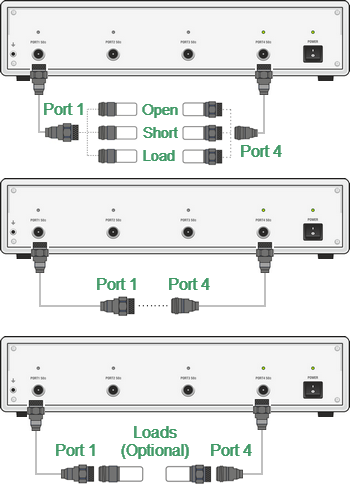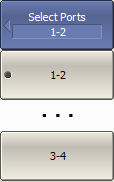A full two-port calibration (SOLT) involves seven connections of standards. This calibration combines two one-port calibrations for each test port with measurement of a THRU standard in both directions (See figure below). An optional isolation calibration can be performed by measurement of two LOAD standards connected to both test ports of the Analyzer.
note |
For isolation calibration, set a narrow IF bandwidth and firmly attach the cables. |
Full two-port calibration allows for correction of all the twelve error terms of a two-port error model: Ed1, Ed2, Es1, Es2, Er1, Er2, Et1, Et2, El1, El2, Ex1, Ex2 (correction of Ex1, Ex2 can be omitted).
Full two-port calibration is a highly accurate method of calibration for two-port DUT measurements.

Full two-port calibration
Before starting calibration perform, select an active channel, set the parameters of the channel (frequency range, IF bandwidth, etc), and select the calibration kit.
|
To open full two-port calibration submenu, use the following softkeys: Calibration > Calibrate > 2-Port SOLT Cal |
|
Select the port pair to be calibrated using Select Ports softkey. |
|
Connect SHORT, OPEN, and LOAD standards to the 1 and 2 ports in any consequence, as shown in the above figure. Perform measurements clicking the softkey Port n Open, Port n Short, Port n Load corresponding to the connected standard. The instrument status bar will indicate Calibration in progress... when the measurement is in progress. On completion of the measurement, a check mark will appear in the left part of the softkey. |
|
Connect a THRU standard between the test ports. If the port connectors allow through connection connect them directly (zero electrical length thru). Perform measurement using the Port 1–2 Thru softkeys. The instrument status bar will indicate Calibration in progress... when the measurement is in progress. On completion of the measurement, a check mark will appear in the left part of the softkey. |
|
To perform the optional isolation calibration, connect two LOAD standards to the test ports as shown in the above figure and enable measurement using the Port 1–2 Isol (Optional) softkeys. The instrument status bar will indicate Calibration in progress... when the measurement is in progress. On completion of the measurement, a check mark will appear in the left part of the softkey. |
|
To complete the calibration procedure, click Apply. This will activate the process of calibration coefficient table calculation and saving it into the memory. The error correction function will also be automatically enabled. |
|
To clear the measurement results of the standard, click Cancel. This softkey does not cancel the current calibration. To disable the current calibration, turn off the error correction function (See Error Correction Disabling). |
|
|
note |
The calibration status can be checked in channel status bar (See General error correction status table) or in trace status field (See Trace error correction status table). |











